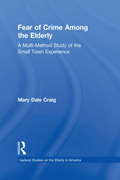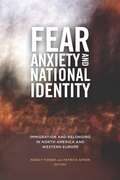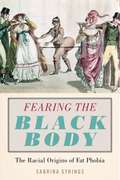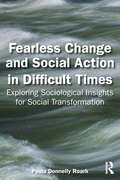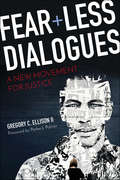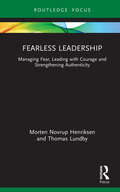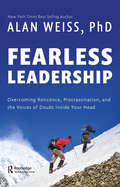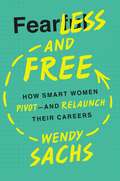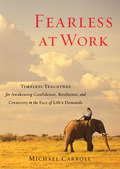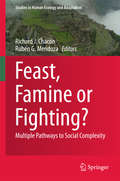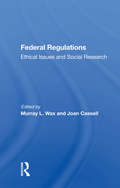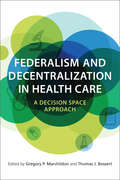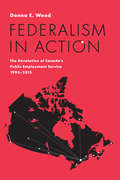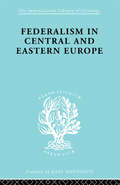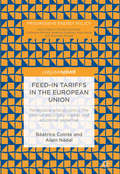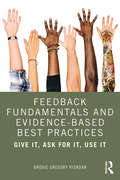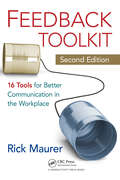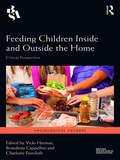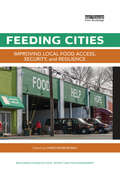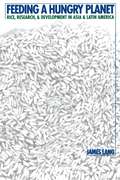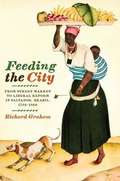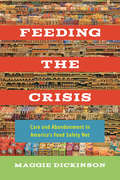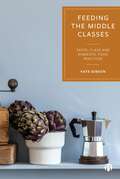- Table View
- List View
Fear of Crime Among the Elderly: A Multi-Method Study of the Small Town Experience (Garland Studies on the Elderly in America)
by Mary Dale CraigFirst published in 2000. Routledge is an imprint of Taylor & Francis, an informa company.
Fear, Anxiety, and National Identity: Immigration and Belonging in North America and Western Europe
by Nancy Foner Patrick SimonFifty years of large-scale immigration has brought significant ethnic, racial, and religious diversity to North America and Western Europe, but has also prompted hostile backlashes. In Fear, Anxiety, and National Identity, a distinguished multidisciplinary group of scholars examine whether and how immigrants and their offspring have been included in the prevailing national identity in the societies where they now live and to what extent they remain perpetual foreigners in the eyes of the long-established native-born. What specific social forces in each country account for the barriers immigrants and their children face, and how do anxieties about immigrant integration and national identity differ on the two sides of the Atlantic? Western European countries such as Germany, the Netherlands, and the United Kingdom have witnessed a significant increase in Muslim immigrants, which has given rise to nativist groups that question their belonging. Contributors Thomas Faist and Christian Ulbricht discuss how German politicians have implicitly compared the purported “backward” values of Muslim immigrants with the German idea of Leitkultur, or a society that values civil liberties and human rights, reinforcing the symbolic exclusion of Muslim immigrants. Similarly, Marieke Slootman and Jan Willem Duyvendak find that in the Netherlands, the conception of citizenship has shifted to focus less on political rights and duties and more on cultural norms and values. In this context, Turkish and Moroccan Muslim immigrants face increasing pressure to adopt “Dutch” culture, yet are simultaneously portrayed as having regressive views on gender and sexuality that make them unable to assimilate. Religion is less of a barrier to immigrants’ inclusion in the United States, where instead undocumented status drives much of the political and social marginalization of immigrants. As Mary C. Waters and Philip Kasinitz note, undocumented immigrants in the United States. are ineligible for the services and freedoms that citizens take for granted and often live in fear of detention and deportation. Yet, as Irene Bloemraad points out, Americans’ conception of national identity expanded to be more inclusive of immigrants and their children with political mobilization and changes in law, institutions, and culture in the wake of the Civil Rights Movement. Canadians’ views also dramatically expanded in recent decades, with multiculturalism now an important part of their national identity, in contrast to Europeans’ fear that diversity undermines national solidarity. With immigration to North America and Western Europe a continuing reality, each region will have to confront anti-immigrant sentiments that create barriers for and threaten the inclusion of newcomers. Fear, Anxiety, and National Identity investigates the multifaceted connections among immigration, belonging, and citizenship, and provides new ways of thinking about national identity.
Fearing the Black Body: The Racial Origins of Fat Phobia
by Sabrina StringsWinner, 2020 Body and Embodiment Best Publication Award, given by the American Sociological AssociationHonorable Mention, 2020 Sociology of Sex and Gender Distinguished Book Award, given by the American Sociological AssociationHow the female body has been racialized for over two hundred years There is an obesity epidemic in this country and poor black women are particularly stigmatized as “diseased” and a burden on the public health care system. This is only the most recent incarnation of the fear of fat black women, which Sabrina Strings shows took root more than two hundred years ago.Strings weaves together an eye-opening historical narrative ranging from the Renaissance to the current moment, analyzing important works of art, newspaper and magazine articles, and scientific literature and medical journals—where fat bodies were once praised—showing that fat phobia, as it relates to black women, did not originate with medical findings, but with the Enlightenment era belief that fatness was evidence of “savagery” and racial inferiority. The author argues that the contemporary ideal of slenderness is, at its very core, racialized and racist. Indeed, it was not until the early twentieth century, when racialized attitudes against fatness were already entrenched in the culture, that the medical establishment began its crusade against obesity. An important and original work, Fearing the Black Body argues convincingly that fat phobia isn’t about health at all, but rather a means of using the body to validate race, class, and gender prejudice.
Fearing the Immigrant: Racialization and Urban Policy in Toronto
by Parastou SaberiA fascinating deep dive into one city&’s urban policy—and the anxiety over immigrants that informs it The city of Toronto is often held up as a leader in diversity and inclusion. In Fearing the Immigrant, however, Parastou Saberi argues that Toronto&’s urban policies are influenced by a territorialized and racialized security agenda—one that parallels the &“War on Terror.&” Focusing on the figure of the immigrant and so-called immigrant neighborhoods as the targets of urban policy, Saberi offers an innovative, multidisciplinary approach to the politics of racialization and the governing of alterity through space in contemporary cities.A comprehensive study of urban policymaking in Canada&’s largest city from the 1990s to the late 2010s, Fearing the Immigrant uses Toronto as a jumping-off point to understand how the nexus of development, racialization, and security works at the urban and international levels. Saberi situates urban policymaking in Toronto in relation to the dominant policies of international development and public health, counterinsurgency, and humanitarian intervention. Engaging with the genealogies and contemporary developments of major policy techniques involving mapping and policy concepts such as poverty, security, policing, development, empowerment, as well as social determinants of health, equity, and prevention, she scrutinizes the parallel ways these techniques and concepts operate in urban policy and international relations. Fearing the Immigrant ultimately asserts that the geopolitical fear of the immigrant is central to the formation of urban policy in Toronto. Rather than addressing the root causes of poverty, urban policy as it has been practiced aims to pacify the specter of urban unrest and to secure the production of a neocolonial urban order. As such, this book is an urgent call to reimagine urban policy in the name of equality and social justice.
Fearless Change and Social Action in Difficult Times: Exploring Sociological Insights for Social Transformation
by Paula Donnelly RoarkOur divided politics, unable to solve the challenges we face concerning society’s hierarchies of injustice, poverty, endless war, and climate change, are now backtracking to even more division. But the reality goes far deeper than the simple politics of left and right. For true change, we need something more profound: a culture shift, a collective change of consciousness.Fearless Change and Social Action in Difficult Times argues that culture shifts don’t just happen, they require a strong focus on social and cultural human connection which neither political nor economic power can provide alone. It is only deep participation and social integrative power which have the capacity to create these necessary cultural and societal transformations. Developing awareness in participatory groups of thought-worlds which remain out-of-sight but give cover to the implicit rules of culture and society is the first step to creating shared awareness of constructs and negative thought-worlds that subconsciously support inequality. Consciously putting aside those that are negative allows for the emergence of new positive realities and social movements. Thus, the real revolution is of the mind. It does take courage, but this is the process by which better futures are created.Offering significant contributions to sociology and social theory, this book promotes an understanding that societal change is rooted in social power and cultural shifts. Inclusive in its presentation, students, professors, NGO professionals, volunteers, activists, and interested observers will find this book of high interest.
Fearless Dialogues: A New Movement For Justice
by Gregory C. Ellison IIDrawing on all the community's collective voices--from "doctors to drug dealers"--Fearless Dialogues is a groundbreaking program that seeks real solutions to problems of chronic unemployment, violence, and hopelessness. In cities around the United States and now the world, the program's founder, Gregory C. Ellison, and his team create conversations among community members who have never spoken to one another, the goal of which are real, implementable, and lasting changes to the life of the community. <P><P>These community transformations are based on both face-to-face encounters and substantive analysis of the problems the community faces. In Fearless Dialogues: A New Movement for Justice, Ellison makes this same kind of analysis available to readers, walking them through the steps that must be taken to find common ground in our divided communities and then to implement genuine and lasting change.
Fearless Leadership: Managing Fear, Leading with Courage and Strengthening Authenticity (Routledge Focus on Business and Management)
by Morten Henriksen Thomas LundbyAll management starts with self-management – handle fear and become an authentic leader. Often, the problem with management is not theoretical, but practical. Managers know enough about leadership, but a lot of them do not act accordingly. They know what should be done in a given situation but fear the discomfort and uncertainty that comes with it. The fear keeps many managers from stepping up to their responsibility. Therefore, the fear in leadership is playing a decisive role in the life and effectiveness of organizations. Based on research on the theoretical knowledge and the practical behavior of managers, combined with a long-time experience as consultants, the authors argue for the importance of practical judgment and emotional courage in management. This is essential in acting as an authentic leader, who does not feel paralyzed and trapped in paradoxes. Management books typically address the question of "what is good management," whereas this book is concerned with how to practice good management by exercising fearless leadership and emotional courage. It is a practical book that aims at inspiring the reader to act by providing specific tools and methods and will be of value to researchers, academics, practitioners, and students in the fields of leadership, strategic management, organizational studies and behavior, management development, and industrial and organizational psychology.
Fearless Leadership: Overcoming Reticence, Procrastination, and the Voices of Doubt Inside Your Head
by Alan WeissThe intent of this book -- the author's goal for you — is to understand the baseless underpinnings of almost all our fears. You read that correctly -- almost all our fears -- and therefore to discard them. The author has expertly coached leaders and managers in the discovery of, examination of, elimination of, and sustained freedom from fears. We all know people who are charming and articulate, but flounder on a stage addressing colleagues; musicians who master intricate scores but can’t play the basics when asked to solo; athletes who "choke"; business people who are strong until it comes time to ask for the business; people who consistently feel like "imposters." We are far better at dealing with external, tangible fears than our own imagined ones. We purchase insurance, watch the safety demonstrations, know how to use the Heimlich Maneuver. But those are responses to rare and often never-occurring emergencies. Our mythical and monstrous fears are daily dark clouds, masking our talents no less than depression or guilt. It’s time to realize there is no monster under the bed, never has been, and never will be without having to check nightly and without needing a weapon on the night table. Picture yourself freed of restraints that you could never properly articulate and were loath to discuss, but which you carried on your shoulders constantly, a dead weight, nonetheless. Essentially, this book is for entrepreneurs, business owners, and those who seek a better position for themselves and their talents, but who procrastinate, delay, and hang back. It’s about isolating and overcoming the internal fears that we generate every day like a geyser, triggered by time, events, or shifts in the environment. We are our own worst enemies and we ignore the practical remedies to escape fear because we use our energies instead on blaming everyone else.
Fearless and Free: How Smart Women Pivot--and Relaunch Their Careers
by Wendy SachsIn Fearless and Free, author Wendy Sachs provides pithy, invaluable guidance to women stymied in the workplace.Women tend to be inherently cautious, to the point of overthinking their every move. This may help them stay safer than their male counterparts, but it also keeps them stuck in the action-first, fake-it-til-you-make-it ethos celebrated in the tech world shaking up the workforce today.What if women embraced the startup spirit? What if they had the confidence to take chances, even if they knew they may fail first? What if instead of agonizing over which step to take, they leapt forward quickly? These are the traits that helped Silicon Valley redefine our culture, and not surprisingly, these are the same lessons that can help all women succeed in all stages of their careers.With lessons learned from a wide range of women who faced down fears, roadblocks, and failures to reinvent themselves, Sachs&’s invaluable resource teaches women how to:Boost their confidenceSell their storyCapitalize on their skills and expand themNurture their networkBrand themselves--without braggingReposition themselves for reentering the workforceBy taking the disruptive methods that helped Silicon Valley send shockwaves across industries, Fearless and Free seeks to empower women in the workforce, showing them how to lean into their strengths, increase confidence, and make their impact known loud and clear.
Fearless at Work: Timeless Teachings for Awakening Confidence, Resilience, and Creativity in the F ace of Life's Demands
by Michael CarrollWork is such a crucial part of our life, and yet we often struggle with--and feel overwhelmed by--the numerous challenges it presents us. Whether it's job insecurity, making peace with or leaving an unfulfilling job, or dealing with office conflicts, we often experience fear and a sense of groundlessness just at a time when we want to be our most creative and resilient. Drawing on Buddhist philosophy, Michael Carroll, a longtime human-resources executive, meditation teacher, and executive coach, explains how the practice of mindfulness--full awareness of our moment-to-moment experience--can help us become more confident and open to possibility in our work life. He offers a system of potent, inspiring principles that we can use as a practice for helping us work with our insecurities and awakening our natural bravery, resourcefulness, and resilience.
Feast, Famine or Fighting?: Multiple Pathways to Social Complexity (Studies in Human Ecology and Adaptation #8)
by Richard J. Chacon Rubén G. MendozaThe advent of social complexity has been a longstanding debate among social scientists. Existing theories and approaches involving the origins of social complexity include environmental circumscription, population growth, technology transfers, prestige-based and interpersonal-group competition, organized conflict, perennial wartime leadership, wealth finance, opportunistic leadership, climatological change, transport and trade monopolies, resource circumscription, surplus and redistribution, ideological imperialism, and the consideration of individual agency.However, recent approaches such as the inclusion of bioarchaeological perspectives, prospection methods, systematically-investigated archaeological sites along with emerging technologies are necessarily transforming our understanding of socio-cultural evolutionary processes. In short, many pre-existing ways of explaining the origins and development of social complexity are being reassessed. Ultimately, the contributors to this edited volume challenge the status quo regarding how and why social complexity arose by providing revolutionary new understandings of social inequality and socio-political evolution.
Federal Regulations: Ethical Issues And Social Research
by Joan Cassell Murray L. WaxAs the federal government elaborates its networks of control over social research, some investigators feel that federal regulations mean only increased costs and constricted research opportunities; others see the possibility of better research through the informed interaction between investigator and subjects that can be brought about by these same regulations. This book—in which responsible social research is defended as essential for intelligent social policy--pre-sents the effects of federal regulations on various research methodologies, with particular attention to their differential impact on qualitative and quantitative studies. It also presents material on the formation and nature of the federal regulatory system, the effects of research on the different kinds of populations studies, and the conflicts among professional associations with regard to regulation.
Federalism and Decentralization in Health Care: A Decision Space Approach
by Gregory Marchildon Thomas J. BossertWhile health system decentralization is often associated with federations, there has been limited study on the connection between federalism and the organization of publicly financed or mandated health services. Federalism and Decentralization in Health Care examines eight federations that differ in terms of their geography, history and constitutional and political development. Looking at Canada, Brazil, Germany, Mexico, Nigeria, Pakistan, South Africa and Switzerland, Federalism and Decentralization in Health Care examines constitutional responsibility for health care, the national laws establishing a right to health care, the predominant sources and organization of public revenues directed to health care, and the overall organization of the health system. In additional to these structural features, each country case study is subjected to a "decision space analysis" to determine the actual degree of health system decentralization. This involves determining whether national and subnational governments have narrow, moderate or broad discretion in their decisions on governance, access, human resources, health system organization and financing. This comparative approach highlights the similarities and differences among these federations. Offering reflections on recent trends in centralization or decentralizations for the health system as a whole, Federalism and Decentralization in Health Care, is a valuable resource for those studying health care policy in federal systems and especially those interested in comparative aspects of the topic.
Federalism in Action: The Devolution of Canada’s Public Employment Service, 1995-2015 (IPAC Series in Public Management and Governance)
by Donna E. WoodEvery developed country has a public employment service that connects job seekers with employers through information, placement, and training support services. In Federalism in Action, Donna E. Wood assesses how Canada’s public employment service is performing after responsibility was transferred from the federal government to provinces, territories, and Aboriginal organizations between 1995 and 2015. Drawing upon over twenty years of data, Wood reveals the governance choices provinces made, the reasons behind these choices, and the outcomes they achieved. Provincial decisions regarding employment programming is an important public policy issue about which little is known, and even less understood within the context of Aboriginal communities. Federalism in Action includes analytical comparisons of Canada’s employment programming with the United States, Australia, and the European Union, as well as information from insightful interviews with key informants from every province. In firmly placing Canada within the extensive international literature on the governance of welfare-to-work policies, this book makes an important new contribution to research.
Federalism in Central and Eastern Europe (International Library of Sociology)
by Rudolf SchlesingerFirst Published in 1998. Routledge is an imprint of Taylor & Francis, an informa company.
Feed-in tariffs in the European Union
by Alain Nadaï Béatrice CointeThis book is a sociological account of the historical trajectory of feed-in tariffs (FITs) as an instrument for the promotion of renewable energy in Europe. Chapters analyse the emergence and transformations of feed-in tariffs as part of the policy arsenal developed to encourage the creation of markets for RES-E in Europe. The authors explore evolving conceptions of renewable energy policy at the intersection between environmental objectives, technological change and the ambition to liberalise the internal electricity market. They draw conclusions on the relationships between markets and policy-making as it is instituted in the European Union, and on the interplay between the implementation of a European vision on energy and national politics. Distinctive in both its approach and its methods the books aim is not to discuss the design of feed-in tariffs and their evolution, nor is it to assess their efficiency or fairness. Instead, the authors seek to understand what makes feed-in tariffs what they are, and how this has changed over time.
Feedback Fundamentals and Evidence-Based Best Practices: Give It, Ask for It, Use It
by Brodie Gregory RiordanFeedback is an incredibly valuable source of information – it enables us to be more self-aware and understand what we are doing well, and it tells us what we could be doing differently, more of, or less of to improve our performance and achieve our goals. Feedback Fundamentals and Evidence-Based Best Practices: Give It, Ask for It, Use It provides an essential overview of feedback fundamentals, what gets in the way of effective feedback exchanges, and the impact of technology on feedback interactions. The value of feedback is often unrealized because people dread giving it, dread receiving it, and may not know what to do with it once they get it. Feedback Fundamentals and Evidence-Based Best Practices balances research, testimonials, and practical tools to provide readers with a thorough understanding of feedback exchanges. Critical findings from decades of research in psychology, business, and other disciplines are distilled into tools and strategies that readers can easily adopt in their own lives, regardless of who they are or what they do. Throughout the book are a wealth of examples from a variety of people and situations, both within and outside traditional work contexts. Feedback Fundamentals and Evidence-Based Best Practices: Give It, Ask for It, Use It is a crucial resource for professionals, leaders, and anyone of any industry or stage in life looking to give better feedback, proactively ask for feedback, gracefully receive feedback, and put that feedback to use.
Feedback Toolkit: 16 Tools for Better Communication in the Workplace, Second Edition
by Nigel Hooper Rick MaurerThis book provides expert guidance on using feedback as a performance improvement tool. It includes many simple tools readers can use to improve feedback in their work unit. The book suggests that feedback works best when the giver and receiver realize that they are in a dance together.
Feeding Children Inside and Outside the Home: Critical Perspectives (Sociological Futures)
by Charlotte Faircloth Vicki Harman Benedetta CappelliniThis cross-disciplinary volume brings together diverse perspectives on children’s food occasions inside and outside of the home across different geographical locations. By unpacking mundane food occasions - from school dinners to domestic meals and from breakfast to snacks - Feeding Children Inside and Outside the Home shows the role of food in the everyday lives of children and adults around them. Investigating food occasions at home, schools and in nurseries during weekdays and holidays, this book reveals how children, mothers, fathers, teachers and other adults involved in feeding children, understand, make sense of and navigate ideological discourses of parenting, health imperatives and policy interventions. Revealing the material and symbolic complexity of feeding children, and the role that parenting and healthy discourses play in shaping, perpetuating and transforming both feeding and eating, this volume shows how micro and macro aspects are at play in mundane and everyday practices of family life and education. This volume will be of great interested to a wide range of students and researchers interested in the sociology of family life, education, food studies and everyday consumption.
Feeding Cities: Improving local food access, security, and resilience (Routledge Studies in Food, Society and the Environment)
by Christopher BossoThere is enormous current interest in urban food systems, with a wide array of policies and initiatives intended to increase food security, decrease ecological impacts and improve public health. This volume is a cross-disciplinary and applied approach to urban food system sustainability, health, and equity. The contributions are from researchers working on social, economic, political and ethical issues associated with food systems. The book's focus is on the analysis of and lessons obtained from specific experiences relevant to local food systems, such as tapping urban farmers markets to address issues of food access and public health, and use of zoning to restrict the density of fast food restaurants with the aim of reducing obesity rates. Other topics considered include building a local food business to address the twin problems of economic and nutritional distress, developing ways to reduce food waste and improve food access in poor urban neighborhoods, and asking whether the many, and diverse, hopes for urban agriculture are justified. The chapters show that it is critical to conduct research on existing efforts to determine what works and to develop best practices in pursuit of sustainable and socially just urban food systems. The main examples discussed are from the United States, but the issues are applicable internationally.
Feeding Japan: The Cultural and Political Issues of Dependency and Risk
by Andreas Niehaus Tine WalravensThis edited collection explores the historical dimensions, cultural practices, socio-economic mechanisms and political agendas that shape the notion of a national cuisine inside and outside of Japan. Japanese food is often perceived as pure, natural, healthy and timeless, and these words not only fuel a hype surrounding Japanese food and lifestyle worldwide, but also a domestic retro-movement that finds health and authenticity in ‘traditional’ ingredients, dishes and foodways. The authors in this volume bring together research from the fields of history, cultural and religious studies, food studies as well as political science and international relations, and aim to shed light on relevant aspects of culinary nationalism in Japan while unearthing the underlying patterns and processes in the construction of food identities.
Feeding a Hungry Planet
by James LangRice is the food crop the world depends on most. In Feeding a Hungry Planet, James Lang demonstrates how research has benefited rice growers and increased production. He describes the life cycle of a rice crop and explains how research is conducted and how the results end up growing in a farmer's field. Focusing on Asia and Latin America, Lang explores lowland and upland rice systems, genetics, sustainable agriculture, and efforts to narrow the gap between yields at research stations and those on working farms. Ultimately, says Lang, the ability to feed growing populations and protect fragile ecologies depends as much on the sustainable on-site farm technologies as on high-yielding crop varieties. Lang views agriculture as a chain of events linking the farmer's field with the scientist's laboratory, and he argues that rice cultivation is shaped by different social systems, cultures, and environments. Describing research conducted by the International Rice Research Institute in the Philippines and by the International Center for Tropical Agriculture in Colombia, he shows how national programs tailor research to their own production problems. According to Lang, the interaction of research programs, practical problem solving, and local extension efforts suggests a new model for international development.
Feeding the City
by Richard GrahamOn the eastern coast of Brazil, facing westward across a wide magnificent bay, lies Salvador, a major city in the Americas at the end of the eighteenth century. Those who distributed and sold food, from the poorest street vendors to the most prosperous traders—black and white, male and female, slave and free, Brazilian, Portuguese, and African—were connected in tangled ways to each other and to practically everyone else in the city, and are the subjects of this book. Food traders formed the city’s most dynamic social component during the late eighteenth and early nineteenth centuries, constantly negotiating their social place. The boatmen who brought food to the city from across the bay decisively influenced the outcome of the war for Brazilian independence from Portugal by supplying the insurgents and not the colonial army. Richard Graham here shows for the first time that, far from being a city sharply and principally divided into two groups—the rich and powerful or the hapless poor or enslaved—Salvador had a population that included a great many who lived in between and moved up and down. The day-to-day behavior of those engaged in food marketing leads to questions about the government’s role in regulating the economy and thus to notions of justice and equity, questions that directly affected both food traders and the wider consuming public. Their voices significantly shaped the debate still going on between those who support economic liberalization and those who resist it.
Feeding the Crisis: Care and Abandonment in America's Food Safety Net (California Studies in Food and Culture #71)
by Maggie DickinsonThe Supplemental Nutrition Assistance Program (SNAP), formerly known as food stamps, is one of the most controversial forms of social welfare in the United States. Although it’s commonly believed that such federal programs have been cut back since the 1980s, Maggie Dickinson charts the dramatic expansion and reformulation of the food safety net in the twenty-first century. Today, receiving SNAP benefits is often tied to work requirements, which essentially subsidizes low-wage jobs. Excluded populations—such as the unemployed, informally employed workers, and undocumented immigrants—must rely on charity to survive.Feeding the Crisis tells the story of eight families as they navigate the terrain of an expanding network of assistance programs in which care and abandonment work hand in hand to make access to food uncertain for people on the social and economic margins. Amid calls at the federal level to expand work requirements for food assistance, Dickinson shows us how such ideas are bad policy that fail to adequately address hunger in America. Feeding the Crisis brings the voices of food-insecure families into national debates about welfare policy, offering fresh insights into how we can establish a right to food in the United States.
Feeding the Middle Classes: Taste, Class and Domestic Food Practices
by Kate GibsonPolitical and public stories about class and food rarely scrutinize how socio-economic and cultural resources enable access to certain foods. Tracing the symbolic links between everyday eating at home and broader social frameworks, this book examines how classed relations play out in middle-class homes to show why class is relevant to all understandings of food in Great Britain. The author illuminates how ‘good’ food, and the identities configured through its consumption, is associated with middle-class lifestyles and why this relationship is often unquestioned and thus saliently normalized. Considering food consumption in a wider social context, the book offers an alternative understanding of class relations, which extends academic, political and public debates about privilege.
